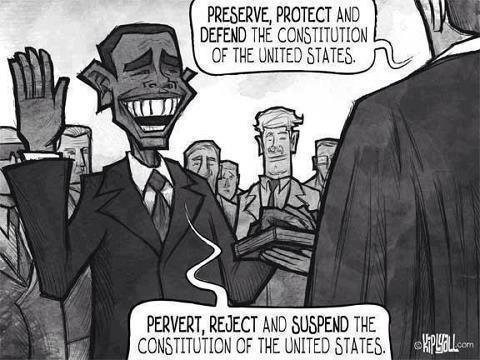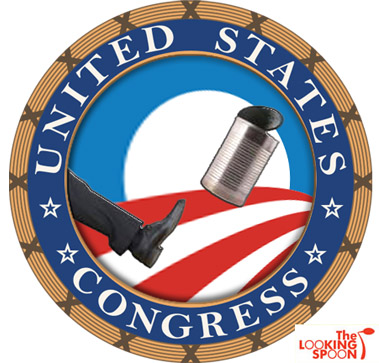The Fourteenth Amendment does not grant the President unilateral authority to ignore the debt ceiling imposed by the Congress.
But what if he does it anyway?
There has been talk since at least 2011 about presidential reliance on the Fourteenth Amendment unilaterally to ignore the debt ceiling. In view of the approach of a new debt ceiling debate and President Obama’s stated position that he will not negotiate concerning it, such talk is again au courant (as Senator Kerry, our next Secretary of State, might put it).
The Obama Administration position, as stated by Press Secretary Carney on December 6, 2012, was
that the Obama administration does not believe they can unilaterally raise the nation’s borrowing limit under the 14th Amendment to the Constitution.
“This administration does not believe that the 14th Amendment gives the president the power to ignore the debt ceiling — period,” Carney told reporters Thursday.
I don’t think that President Obama will need to assert such authority because the Congress will cave. However, should he find it appropriate to do that, his statements tend to have undisclosed expiration dates.
The Fourteenth Amendment
Section 4 of the Fourteenth Amendment provides,
The validity of the public debt of the United States, authorized by law, including debts incurred for payment of pensions and bounties for services in suppressing insurrection or rebellion, shall not be questioned. But neither the United States nor any State shall assume or pay any debt or obligation incurred in aid of insurrection or rebellion against the United States, or any claim for the loss or emancipation of any slave; but all such debts, obligations and claims shall be held illegal and void.
The Heritage Organization argued here, I think persuasively, that
At most, this clause might require the federal government to prioritize debt payments on existing debt, but no one doubts there is enough tax revenue to cover service on existing debt—without incurring more debt. Besides, the President’s unilateral action to add new debt in violation of a debt limit would not be “authorized by law” and so would be the opposite of what the clause requires.
In addition, unilateral action by the President to take on additional debt would be a clear violation of the Constitution’s separation of powers. After all, the Constitution vests in Congress—and withholds from the Executive—the power to commit to spending, to raise revenue by enacting taxes, and to incur public debt. The Fourteenth Amendment did not alter this. Congressional control of borrowing, through the debt limit, and section four of the amendment are in unison, not tension.
The Judicial system

 The branch of government that one would expect to provide a definitive interpretation of the Fourteenth Amendment is the judicial branch, ultimately U.S. Supreme Court. For the Court to make such an interpretation, it would have to be presented with a case in which to do it. The case would presumably begin in one of the inferior Federal courts and take a long time to get to the Supreme Court, should it get there at all.
The branch of government that one would expect to provide a definitive interpretation of the Fourteenth Amendment is the judicial branch, ultimately U.S. Supreme Court. For the Court to make such an interpretation, it would have to be presented with a case in which to do it. The case would presumably begin in one of the inferior Federal courts and take a long time to get to the Supreme Court, should it get there at all.
The doctrine of “standing” would most likely prevent substantive judicial review.
There are three requirements for Article III standing: (1) injury in fact, which means an invasion of a legally protected interest that is (a) concrete and particularized, and (b) actual or imminent, not conjectural or hypothetical; (2) a causal relationship between the injury and the challenged conduct, which means that the injury fairly can be traced to the challenged action of the defendant, and has not resulted from the independent action of some third party not before the court; and (3) a likelihood that the injury will be redressed by a favorable decision, which means that the prospect of obtaining relief from the injury as a result of a favorable ruling is not too speculative. Lujan v. Defenders of Wildlife, 112 S. Ct. 2130, 2136 (1992) (Lujan). The party invoking federal jurisdiction bears the burden of establishing each of these elements.
Should President Obama rely on the Fourteenth Amendment to ignore the debt ceiling, it is unlikely that anyone could demonstrate a legally cognizable injury due to his action.
As Matthew Zeitlin has argued in TNR, if Obama invoked the Fourteenth Amendment to raise the debt ceiling unilaterally, the most likely outcome is that the Supreme Court would refuse to hear the case. The conservative justices have long required clear evidence of legal “standing” before opening the courthouse door—something they showed in their recent 5-4 decision rejecting a taxpayer’s challenge to an Arizona school vouchers program—and it’s hard to imagine who could establish enough of a legal injury to establish standing in this case. Individual senators and representatives wouldn’t have standing to sue on their own, according to a 1997 Supreme Court precedent, and although the House and Senate could, in theory, pass a joint resolution asserting that the president has injured Congress by usurping its power, they’re unlikely to find the votes to do so. (If the House alone passed a resolution asserting a constitutional injury, its legal status is less certain.)
When it comes to individual taxpayers, they’re likely barred from establishing standing to sue by the definitive precedent on the debt clause of the Fourteenth Amendment, the 1935 Perry case. In that case, a bondholder asserted that the Congressional joint resolution taking the U.S. off the gold standard violated section Four of the Fourteenth Amendment, which says: “The validity of the public debt of the United States, authorized by law, … shall not be questioned.” The Court, in an opinion that supports Obama’s position in every respect, expansively interpreted the constitutional text and said it did indeed prohibit any government policy that “concerns the integrity of the public obligations.” But the Court went on to say that although the bondholder had suffered a constitutional injury, he had no legal standing to sue, since it was impossible to calculate precisely how much of an economic loss he had suffered.
Is that good? No, and I don’t like it. Regardless of what I like, that seems to be “the law” and the best that can reasonably be anticipated is that the courts might take a stand on presidential authority under the Fourteenth Amendment years after he had exercised it. Considering the present (and likely future) composition of the Court, if and when it does consider the matter, I have little confidence that it will concur with the Heritage Foundation’s (and my) views on the intent of the Fourteenth Amendment.
What could the Congress do?
The Congress, particularly the House of Representatives, has arrows in its quiver should President Obama attempt to avoid the debt ceiling through reliance on the Fourteenth Amendment. The House can simply refuse to appropriate any more money and to authorize any additional debt or taxes. Without affirmative vote of the House, any action the Senate might take on the matter would have no legal effect. Under Article I, Section 7,
All Bills for raising Revenue shall originate in the House of Representatives; but the Senate may propose or concur with Amendments as on other Bills.
Under Section 8,
The Congress shall have Power To lay and collect Taxes, Duties, Imposts and Excises, to pay the Debts and provide for the common Defence and general Welfare of the United States; but all Duties, Imposts and Excises shall be uniform throughout the United States;
To borrow Money on the credit of the United States; (Emphasis added.)
What could the President do then?
Without congressionally authorized funding where might the President, as the head of the Executive Branch, get the money needed to run the government? In some circumstances it might be possible to borrow it, although under Section 8, quoted above, that power is vested in the Congress. However, it seems likely that the pucker factor in the debt markets would be quite high in view of Article I, the Fourteenth Amendment and the questions they raise about whether the borrowed funds would ever have to be repaid. Many investors might well prefer to invest in Greek bonds, solar energy and windmills. The House could also go on strike and decline to pass any legislation sought by the Administration.
The President then would likely relish his great opportunity to lambast the heartless and dangerously obstructionist Republicans, the Tea Party and all other domestic terrorist organizations for their maliciously racist actions, characterizing them as the sole cause of the likely downgrade of the nation’s finances and possibly her utter destruction. The mass media would support his thesis and many would agree.
What is the Congress more likely to do instead?
Whether its leaders would have the testicular fortitude to do much beyond cave is highly questionable.
Unfortunately, such fortitude is uncommon and has been for quite a while. As contended in this article by George Will, the entitlement state has grown like Topsy; not because it has been good for the nation but because it has been politically convenient; politicians speak glowingly of their public service, but their principal objective seems to be reelection.
[A]s explained by the Hudson Institute’s Christopher DeMuth in the Dec. 24 Weekly Standard:
Deficit spending once was largely for investments — building infrastructure, winning wars — which benefited future generations, so government borrowing appropriately shared the burden with those generations.
Now, however, continuous borrowing burdens future generations in order to finance current consumption. Today’s policy, says DeMuth, erases “the distinction between investing for the future and borrowing from the future.”
December’s maneuverings made clear that most Americans will be spared the educational experience of fiscal cliff-related tax increases and spending cuts, which would have been a small but instructive taste of the real costs of the entitlement state. Still, December’s maneuverings taught three lessons.
First, there will be no significant spending restraint. Democrats — you know, the people respectful of evidence and science — even rejected a more accurate measurement of the cost of living that would slightly slow increases in myriad government benefits. Accuracy will be sacrificed to liberalism’s agenda of government growth.
Second, Barack Obama has (as Winston Churchill said of an adversary) “the gift of compressing the largest amount of words into the smallest amount of thought.”
His incessant talking swaddles one wee idea — raising taxes on “millionaires and billionaires,” including couples earning less than half a million. He has nothing pertinent to say about the steadily worsening fiscal imbalance that will make sluggish growth —under 3% — normal.
. . . .
As economists Glenn Hubbard and Tim Kane explain in National Affairs quarterly, America’s political system “cannot govern the entitlement state” that “exists largely to provide material benefits to individuals.”
Piling up unsustainable entitlement promises — particularly, enactment of Medicare in 1965 and the enrichment of Social Security benefits in 1972 — has been improvident for the nation but rational for the political class. The promised expenditures, far in excess of revenues, would come due “beyond the horizon of political consequences.”
“Our politicians,” say Hubbard and Kane, “are acting rationally” but “politically rational behavior is now fiscally perverse.” Both parties are responding to powerful electoral incentives to neither raise taxes nor cut spending. Hence, “the clash over raising the debt limit that gripped Washington during the summer of 2011 was just the beginning, not the end, of our fiscal woes.”
But the perils of the entitlement state are no longer (in Hubbard’s and Kane’s words) “safely beyond the politicians’ career horizons.” Furthermore, a critical mass of Republicans reject the careerists’ understanding of “politically rational” behavior. These Republicans have a different rationale for being in politics.
How many members of the Congress — even of the Republican majority in the House — would be willing to suffer the political consequences of a Government shutdown? Social Security checks unsent, welfare payments unsent, EBT cards refused (even at strip joints), no pay for Federal employees (including members of the military) and on and on and on? Probably not enough to do it. If they did it, what would be the likely outcome in the 2014 congressional elections? Probably not pretty. 2016 presidential election? Would they make effective use of the multiple social media available? They might try, but their voices seem likely to be overwhelmed by those of the Obama-friendly mass media.
If, as President Obama has declared ex cathedra, we don’t have “a spending problem” — similar to an alcoholic who has no drinking problem if he can get enough booze — how can the farce continue without ever-increasing revenues, a.k.a. taxes, borrowing or both? It can’t. Because of this conundrum, I seriously doubt that Speaker Boehner and his “honorable” colleagues on the Hill will exhibit the testicular fortitude necessary even to try to tame the beast. Instead, public pronouncements notwithstanding, they will allow the farce to continue and perhaps even seek encores.
Isn’t it time to tell the children that playtime is over and to stop sniveling, and for the adults to take over?





The WSJ posted an article by Keith Hennessey on another idea to fight the debt ceiling:
http://online.wsj.com/article/SB10001424127887324081704578236042135383394.html?mod=WSJ_Opinion_LEADTop
One puzzler on this that’s bothering me is that Congress originally passed the budget that includes massive deficit spending. It seems that since Congress authorized the deficit spending in the first place, it should provide the ability for the Treasury to borrow to pay for it’s spending. Otherwise, they need to offer some cuts to their own budget.
Mike,
To the extent that funds have been borrowed, interest needs to be paid when due and the loans need to be redeemed when due. I understand that the Treasury has sufficient current receipts for interest payments and that repayment of a debt reduces the national debt pro tanto and thereby frees up room under the debt ceiling for replacement borrowing.
Use of current receipts may well require that expenditures previously authorized by the Congress but not yet made (either by spending from current receipts or by borrowing) be delayed. Non payments of Social Security benefits and military wages when due have been threatened, a “Washington Monument” ploy. The threat seems unlikely to be carried out unless President Obama can blame it solely on Republicans. Perhaps articles like this in the Washington Post may make casting such blame solely on the Republicans more difficult.
My guess is that the House and Senate will agree on a modest increase in the debt ceiling but that the House will insist on proportionate spending reductions in return. If the Senate refuses to go along or if it agrees and the President vetoes the resulting bill, then any adverse consequences of not raising the debt limit should fall on the President and/or the Senate. Regardless of where the blame falls in those circumstances, the House should insist on steps to make significant future increases in the debt ceiling unnecessary.
On the revenue side, that probably means revisions to the Tax Code to eliminate various deductions and credits, many of them enacted (some in the now distant past) to distort markets to benefit politically favored causes or businesses. On the expenditure side, that could mean negotiating future spending cuts, a mug’s game because future cuts so negotiated would not be binding in the future and would likely be ignored.
Here’s an idea which I think makes sense:
What are your thoughts?
Dan
Dan,
The idea you posted from NR actually makes some sense. I think it is conditioned on whether it’s possible or not to create some legislative language that will allow the Treasury to only sell bonds to service our current debt. Although as far as the administration and Senate Democrats are concerned, that’s almost the same as not raising the debt ceiling at all. They don’t care about servicing the debt; what they want is to continue spending at the current trillion plus deficit rates. And there is still my original objection: Our so called Tea Party Congress passed a budget with over a trillion dollars in deficit spending for FY 2013 (although calculations as to the exact amount may vary).
I thought of something last year that might be a little easier for the Democrats to swollow:
“…Congress should, without preconditions, give the President the full 1.2 trillion debt ceiling increase that he is requesting… at a level of about 80 billion dollars per month, once a month. This will give the administration well under a trillion dollars to run as a deficit for the next year, then the next year decrease it to 50 billion per month and so on.
That way Congress can get control of both the budget and the budget deficit, and start reducing it based on the debt ceiling authority. The onus for the cuts will fall on the administration to figure out how each department of government cuts spending to get through the year. They apparently don’t want Congress’s help anyway. But there will be plenty of money each month to service the debt and even go billions deeper each month into debt, but just not as much as they had planned.”
There is more than one way to skin this cat, but my guess is that the House will choose none of them, and the cat gets away scot free.
Thanks, Mike
It sounds good but please let me think about it overnight.
I’ve been up to my, er, ears, in other stuff including a new article posted today, the (timely) apparent death of my wife’s computer and (after we had had another built) the discovery that her monitor was also at fault, the necessity to share my computer until her new monitor arrives, another of many internet outages and our likely switch to another less expensive but better ISP. Approaching seventy-two too rapidly, I think sometimes that I may be getting a bit antiquated for that sort of crap. However, no viable alternative has yet appeared.
I will try to respond tomorrow should such sanity as I still have remain.
Dan
Mike,
I guess that would be better than just caving, which it seems that enough Republicans in the House will do. Then, the debt ceiling will continue to rise as we continue to get older but no wiser and lots deeper in debt. Unfortunately it is becoming apparent that that’s what most Americans want, particularly those not paying much for the consequences — yet.
Reblogged this on BPI reblog.